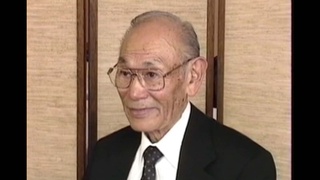Interviews
Hearing about Pearl Harbor
Actually, when I heard the news, at the Japanese school we had Alumni club, those that graduated from the Japanese school. And unfortunately, I happened to be president at the time. So we had some meeting to be held on that Sunday. I don’t know if it was preparing for a Christmas party because it was the 7th. Either it was a Christmas party or preparing for a New Year’s celebration.
So I went there alone, but when I got there, about four or five of us were there at the same time. And the teacher come out there and says, “No, go home.” Why? He said, “Didn’t you know that Pearl Harbor was bombed by the Japanese?” We're wondering, "what is he talking about?" He said, “This may be the last time that you will come to the Japanese school, but don’t come to the Japanese school. Stay away from the Japanese school.”
And so that was it. That’s the last time, that’s what I remember that the war had started in 1941.
Date: February 6, 2015
Location: California, US
Interviewer: John Esaki
Contributed by: Watase Media Arts Center, Japanese American National Museum









